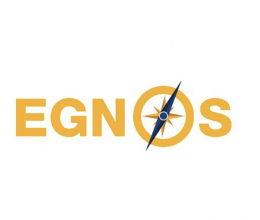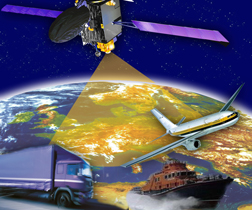Airbus has been selected as the main contractor to develop EGNOS V3, the next generation of Europe’s Satellite Based Augmentation System (SBAS). The company was awarded the contract by the European Space Agency (ESA), which manages EGNOS (European Geostationary Navigation Overlay Service) development under a working arrangement signed with the European GNSS Agency (GSA).
For the next generation of the EGNOS augmentation system, the GSA requested the complete overhaul of the outdated EGNOS ground segment. This modernization program will see the deployment of EGNOS V3 in ground stations at more than 50 sites in Europe, and surrounding countries.
The GSA also requested the development of new EGNOS capabilities to support the augmentation of a second GPS signal (L5) and of the Galileo signals E1-E5. Another requirement is that the system be made more robust, to deal with the increase in user numbers and to reflect their increasing dependence on EGNOS and its ground applications – in some countries (e.g. France) instrument landing systems (ILS) are being decommissioned on several airports because the civil aviation authorities have decided instead to rely on EGNOS.

Under the contract, which was signed on January 26, the ESA and Airbus will provide the GSA with two EGNOS upgrade versions. EGNOS V3.1 will ensure continuity of EGNOS augmentation of GPS L1, but with a more resilient performance, while EGNOS V3.2 will support a new SBAS service, transmitting on the L5 frequency, which will augment Galileo L1/E1 – L5/E5 along with GPS.
EGNOS V3 is planned to provide the aviation community with advanced Safety of Life (SoL) services as well as new services to maritime and land users. EGNOS V3 will provide augmented operational SoL services over Europe that improve the accuracy and availability of user positioning services from existing Global Navigation Satellite Systems (Galileo and GPS) and provides crucial integrity messages to EGNOS users with alerts within a few seconds in case of system degradation, consolidating EGNOS’ position as one of the leading edge GNSS Systems in the future.
EGNOS V3 will thus offer improved SoL services performances (where people’s lives are potentially at stake) over Europe to Civil Aviation community and new applications for maritime or land users, and will improve robustness against increasing security risks, in particular cyber-security risks.
EGNOS V3 will ensure a full continuity of service for the next decade and will be the first operational SBAS implementing the dual frequency and multi constellation world standard, with both GPS and Galileo, replacing EGNOS V2 which has been in operation since 2011.
"This program is strategic for Airbus to strengthen our position in the navigation field. The signature of this contract is the result of more than five years of intense team work and investment," Airbus Head of Space Systems Nicolas Chamussy said in a press release published on the Airbus website. "With our Consortium, we bring a large pool of resources and experience in Europe covering the successful development of critical and secure ground segment. I am confident that we will make EGNOS V3 a success story."
As prime contractor, Airbus will be leading a consortium with partners from France, Germany, Spain and Switzerland. Airbus will be responsible for the development, integration, deployment and preparation of EGNOS V3 operations, the overall performance of the system and the Central Processing Facility which is the heart of the real time navigation algorithms.
Over the span of the 6.5-year contract, around 100 people and 20 subcontractors will work on delivering the EGNOS V3 system, according to Airbus. In 2023, the single frequency version will be available to replace the current operational version and, 18 months later, the final version in dual frequency will be delivered.
EGNOS is composed of a large network of about 50 ground stations deployed over Europe, Africa and North America, two master control centers located near Rome and Madrid, and a System Operation Support Centre in Toulouse. EGNOS will also use geostationary satellites navigation payload.
The GSA’s request for EGNOS V3 development is part of its overall EGNOS modernization program that also includes renewal of the space segment. As part of this program, the GSA has contracted Eutelsat for the preparation and service provision phases of the EGNOS GEO-3 payload, to be hosted on the EUTELSAT 5 West B satellite that is due to be launched this year. Furthermore, the GSA will soon publish a request for information (RFI) on opportunities to deploy future new EGNOS payloads.
The program also covers Europe’s contribution to the development of new SBAS standards for aviation in coordination with ICAO, RTCA and EUROCAE, and the development of a prototype of the SBAS-DFMC multi-frequency (L1-L5), multi-constellation (Galileo-GPS) receiver for aviation, which is being developed by Thales Avionics. After 2025, SBAS-DFMC users will be able to use the new service thanks to EGNOS L5 geo-stationary signals.
In parallel with the EGNOS upgrades, the GSA, with the support of ESSP, ESA and TAS-F, is maintaining the efficient operation of EGNOS V2 until it is time to move to EGNOS V3. For current EGNOS users, the transition between EGNOS V2 and EGNOS V3 will be seamless, as the new system is being developed with backward compatibility.
Call for EGNOS Adoption in Aviation
The GSA has published a 3rd call for proposals with a view to awarding grants to promote EGNOS operational implementation in aviation. The goal of this activity is wide-scale implementation of EGNOS-based operations throughout European airports and among European airspace users.
This call is targeting all aviation segments: commercial, regional, business, general aviation and rotorcraft users interested in EGNOS operational implementation. The objective of the call is to foster the use of EGNOS for navigation and surveillance applications, increase network effect and maximize public benefits.
To achieve the objectives of the call, applicants are expected to conduct one or more of the following activities:
The design and operational implementation of EGNOS based LPV/LPV 200 approach procedures, PinS, low level IFR routes at different European airports/heliports/routes;
Design and implementation of other communication, navigation and surveillance applications benefitting from EGNOS for all phases of flight;
The installation of EGNOS-enabled avionics and granting of airworthiness certification for RNP APCH procedures down to LPV minima, including PinS;
Development of retrofit and forward-fit solutions including LPV capabilities;
Development of enablers and other EGNOS based operations such as, but not limited to, simulators, validation tools, training materials, or drones.
The deadline for submitting applications is May 21, 2018 – at 18:00 CET. GSA is organizing a series of information sessions about the call. The first one will be organized during the ATM World Congress at the FABEC OPS Theatre on March 6 and interested users are very welcome to join. This session will be held in cooperation with INEA, who will present the open CEF Call 2017. More information is available at: https://www.worldatmcongress.org/fabec-ops-theatre.





